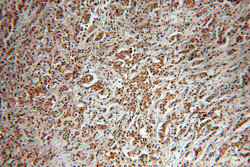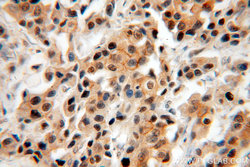Antibody data
- Antibody Data
- Antigen structure
- References [20]
- Comments [0]
- Validations
- Western blot [1]
- Immunohistochemistry [2]
Submit
Validation data
Reference
Comment
Report error
- Product number
- 17707-1-AP - Provider product page

- Provider
- Proteintech Group
- Proper citation
- Proteintech Cat#17707-1-AP, RRID:AB_2272676
- Product name
- USP28 antibody
- Antibody type
- Polyclonal
- Description
- KD/KO validated USP28 antibody (Cat. #17707-1-AP) is a rabbit polyclonal antibody that shows reactivity with human, mouse, rat and has been validated for the following applications: IHC, IP, WB,ELISA.
- Reactivity
- Human, Mouse, Rat
- Host
- Rabbit
- Conjugate
- Unconjugated
- Isotype
- IgG
- Vial size
- 20ul, 150ul
Submitted references USP28 promotes tumorigenesis and cisplatin resistance by deubiquitinating MAST1 protein in cancer cells.
Blocking the interaction between circTNRC18 and LIN28A promotes trophoblast epithelial-mesenchymal transformation and alleviates preeclampsia.
The dimeric deubiquitinase USP28 integrates 53BP1 and MYC functions to limit DNA damage.
The deubiquitinase USP28 maintains the expression of the transcription factor MYCN and is essential in neuroblastoma cells.
Comprehensive prognostic and immunological analysis of Ubiquitin Specific Peptidase 28 in pan-cancers and identification of its role in hepatocellular carcinoma cell lines.
Inhibition of deubiquitinase USP28 attenuates cyst growth in autosomal dominant polycystic kidney disease.
Inhibition of Pard3 promotes breast cancer metastasis via the USP28 mediated deubiquitination of Snail1.
Prostate-specific oncogene OTUD6A promotes prostatic tumorigenesis via deubiquitinating and stabilizing c-Myc.
The deubiquitinase USP28 stabilizes the expression of RecQ family helicases and maintains the viability of triple negative breast cancer cells.
A nonautophagic role of ATG5 in regulating cell growth by targeting c-Myc for proteasome-mediated degradation.
ANKRD26 recruits PIDD1 to centriolar distal appendages to activate the PIDDosome following centrosome amplification.
Regulation of Bax-dependent apoptosis by mitochondrial deubiquitinase USP30.
Loss of polycystins suppresses deciliation via the activation of the centrosomal integrity pathway.
The deubiquitinase USP25 supports colonic inflammation and bacterial infection and promotes colorectal cancer.
Ubiquitin-specific peptidase 28 enhances STAT3 signaling and promotes cell growth in non-small-cell lung cancer.
Distinct USP25 and USP28 Oligomerization States Regulate Deubiquitinating Activity.
The stability and oncogenic function of LIN28A are regulated by USP28.
A USP28-53BP1-p53-p21 signaling axis arrests growth after centrosome loss or prolonged mitosis.
The deubiquitinase USP28 controls intestinal homeostasis and promotes colorectal cancer.
The deubiquitinase USP28 stabilizes LSD1 and confers stem-cell-like traits to breast cancer cells.
Karapurkar JK, Colaco JC, Suresh B, Tyagi A, Woo SH, Jo WJ, Ko N, Singh V, Hong SH, Oh SJ, Kim KS, Ramakrishna S
Cellular and molecular life sciences : CMLS 2024 Mar 18;81(1):145
Cellular and molecular life sciences : CMLS 2024 Mar 18;81(1):145
Blocking the interaction between circTNRC18 and LIN28A promotes trophoblast epithelial-mesenchymal transformation and alleviates preeclampsia.
Chen LL, Li YQ, Kang ZH, Zhang X, Gu SY, Wang N, Shen XY
Molecular and cellular endocrinology 2024 Jan 1;579:112073
Molecular and cellular endocrinology 2024 Jan 1;579:112073
The dimeric deubiquitinase USP28 integrates 53BP1 and MYC functions to limit DNA damage.
Jin C, Einig E, Xu W, Kollampally RB, Schlosser A, Flentje M, Popov N
Nucleic acids research 2024 Apr 12;52(6):3011-3030
Nucleic acids research 2024 Apr 12;52(6):3011-3030
The deubiquitinase USP28 maintains the expression of the transcription factor MYCN and is essential in neuroblastoma cells.
Li J, Peng J, Wu L, Shen X, Zhen X, Zhang Y, Ma H, Xu Y, Xiong Q, Zhu Q, Zhang P
The Journal of biological chemistry 2023 Jul;299(7):104856
The Journal of biological chemistry 2023 Jul;299(7):104856
Comprehensive prognostic and immunological analysis of Ubiquitin Specific Peptidase 28 in pan-cancers and identification of its role in hepatocellular carcinoma cell lines.
Zhou W, Chen J, Wang J
Aging 2023 Jul 13;15(13):6545-6576
Aging 2023 Jul 13;15(13):6545-6576
Inhibition of deubiquitinase USP28 attenuates cyst growth in autosomal dominant polycystic kidney disease.
Ren Y, Zhu X, Fu K, Zhang H, Zhao W, Lin Y, Fang Q, Wang J, Chen Y, Guo D
Biochemical pharmacology 2023 Jan;207:115355
Biochemical pharmacology 2023 Jan;207:115355
Inhibition of Pard3 promotes breast cancer metastasis via the USP28 mediated deubiquitination of Snail1.
Liu Z, Yu Y, Zhou S, Zhang X, Zhou Z
Heliyon 2023 Dec;9(12):e22599
Heliyon 2023 Dec;9(12):e22599
Prostate-specific oncogene OTUD6A promotes prostatic tumorigenesis via deubiquitinating and stabilizing c-Myc.
Peng Y, Liu J, Wang Z, Cui C, Zhang T, Zhang S, Gao P, Hou Z, Liu H, Guo J, Zhang J, Wen Y, Wei W, Zhang L, Liu J, Long J
Cell death and differentiation 2022 Sep;29(9):1730-1743
Cell death and differentiation 2022 Sep;29(9):1730-1743
The deubiquitinase USP28 stabilizes the expression of RecQ family helicases and maintains the viability of triple negative breast cancer cells.
Wang J, Dong Y, Ma H, Wu L, Zhen X, Tang L, Jin J, Han S, Zhang P, Peng J
The Journal of biological chemistry 2022 Jan;298(1):101443
The Journal of biological chemistry 2022 Jan;298(1):101443
A nonautophagic role of ATG5 in regulating cell growth by targeting c-Myc for proteasome-mediated degradation.
Li S, Zhang L, Zhang G, Shangguan G, Hou X, Duan W, Xi Y, Xu N, Zhang B, Dong J, Wang Y, Cui W, Chen S
iScience 2021 Nov 19;24(11):103296
iScience 2021 Nov 19;24(11):103296
ANKRD26 recruits PIDD1 to centriolar distal appendages to activate the PIDDosome following centrosome amplification.
Evans LT, Anglen T, Scott P, Lukasik K, Loncarek J, Holland AJ
The EMBO journal 2021 Feb 15;40(4):e105106
The EMBO journal 2021 Feb 15;40(4):e105106
Regulation of Bax-dependent apoptosis by mitochondrial deubiquitinase USP30.
Yan D, Li X, Yang Q, Huang Q, Yao L, Zhang P, Sun W, Lin S, Dou QP, Liu J, Chen X
Cell death discovery 2021 Aug 11;7(1):211
Cell death discovery 2021 Aug 11;7(1):211
Loss of polycystins suppresses deciliation via the activation of the centrosomal integrity pathway.
Gerakopoulos V, Ngo P, Tsiokas L
Life science alliance 2020 Sep;3(9)
Life science alliance 2020 Sep;3(9)
The deubiquitinase USP25 supports colonic inflammation and bacterial infection and promotes colorectal cancer.
Wang XM, Yang C, Zhao Y, Xu ZG, Yang W, Wang P, Lin D, Xiong B, Fang JY, Dong C, Zhong B
Nature cancer 2020 Aug;1(8):811-825
Nature cancer 2020 Aug;1(8):811-825
Ubiquitin-specific peptidase 28 enhances STAT3 signaling and promotes cell growth in non-small-cell lung cancer.
Li P, Huang Z, Wang J, Chen W, Huang J
OncoTargets and therapy 2019;12:1603-1611
OncoTargets and therapy 2019;12:1603-1611
Distinct USP25 and USP28 Oligomerization States Regulate Deubiquitinating Activity.
Gersch M, Wagstaff JL, Toms AV, Graves B, Freund SMV, Komander D
Molecular cell 2019 May 2;74(3):436-451.e7
Molecular cell 2019 May 2;74(3):436-451.e7
The stability and oncogenic function of LIN28A are regulated by USP28.
Haq S, Das S, Kim DH, Chandrasekaran AP, Hong SH, Kim KS, Ramakrishna S
Biochimica et biophysica acta. Molecular basis of disease 2019 Mar 1;1865(3):599-610
Biochimica et biophysica acta. Molecular basis of disease 2019 Mar 1;1865(3):599-610
A USP28-53BP1-p53-p21 signaling axis arrests growth after centrosome loss or prolonged mitosis.
Lambrus BG, Daggubati V, Uetake Y, Scott PM, Clutario KM, Sluder G, Holland AJ
The Journal of cell biology 2016 Jul 18;214(2):143-53
The Journal of cell biology 2016 Jul 18;214(2):143-53
The deubiquitinase USP28 controls intestinal homeostasis and promotes colorectal cancer.
Diefenbacher ME, Popov N, Blake SM, Schülein-Völk C, Nye E, Spencer-Dene B, Jaenicke LA, Eilers M, Behrens A
The Journal of clinical investigation 2014 Aug;124(8):3407-18
The Journal of clinical investigation 2014 Aug;124(8):3407-18
The deubiquitinase USP28 stabilizes LSD1 and confers stem-cell-like traits to breast cancer cells.
Wu Y, Wang Y, Yang XH, Kang T, Zhao Y, Wang C, Evers BM, Zhou BP
Cell reports 2013 Oct 17;5(1):224-36
Cell reports 2013 Oct 17;5(1):224-36
No comments: Submit comment
Supportive validation
- Submitted by
- Proteintech Group (provider)
- Main image

- Experimental details
- HeLa cells were subjected to SDS PAGE followed by western blot with 17707-1-AP(USP28 antibody) at dilution of 1:1000
- Sample type
- cell line
Supportive validation
- Submitted by
- Proteintech Group (provider)
- Main image

- Experimental details
- Immunohistochemical of paraffin-embedded human breast cancer using 17707-1-AP(USP28 antibody) at dilution of 1:50 (under 10x lens)
- Sample type
- tissue
- Submitted by
- Proteintech Group (provider)
- Main image

- Experimental details
- The USP28 antibody from Proteintech is a rabbit polyclonal antibody to a recombinant protein of human USP28. This antibody recognizes human,mouse,rat antigen. The USP28 antibody has been validated for the following applications: ELISA, WB, IHC analysis.
 Explore
Explore Validate
Validate Learn
Learn Western blot
Western blot ELISA
ELISA